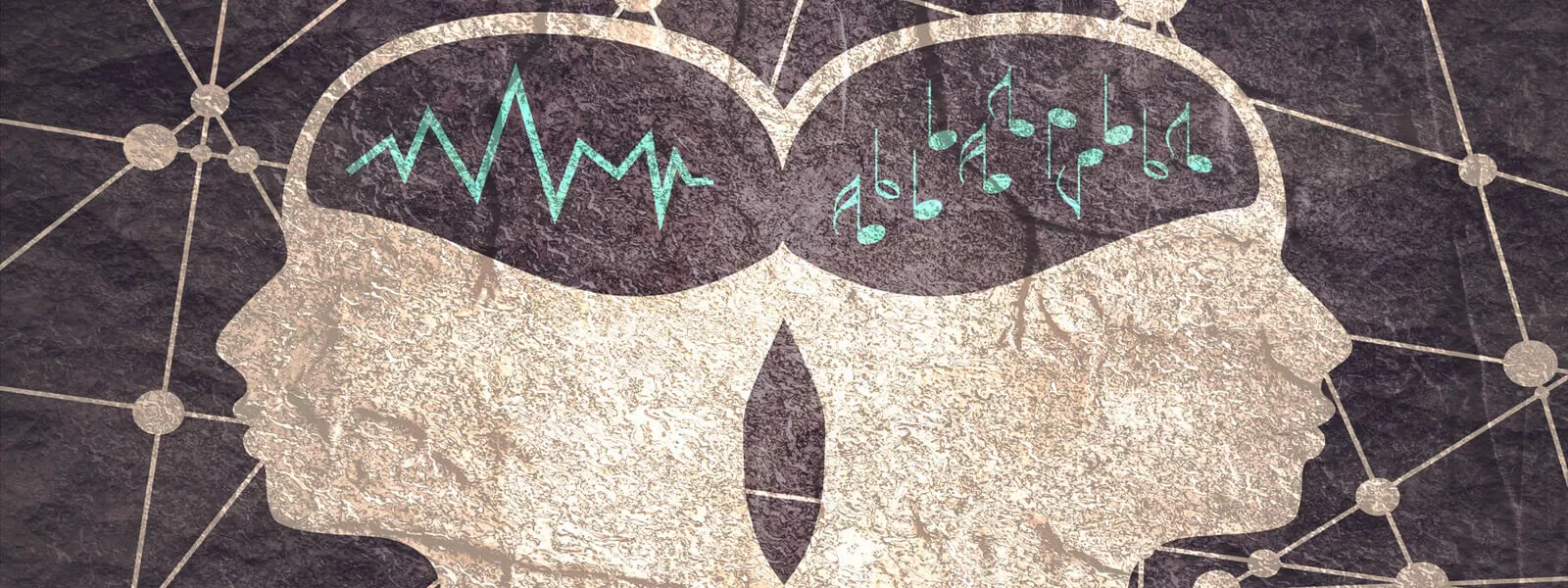Why — and How — Music Moves Us

“Life seems to go on without effort when I am filled with music.” – George Eliot
Instinctually, intuitively, we know that music makes life better.
For millennia, humans have used music to soothe to our souls and comfort pain. Parents worldwide sing lullabies to the young and mark special occasions such as birthdays, graduations, and weddings with song. We rely on music to help us power through workouts and tackle tasks we’d rather ignore, and we manipulate our moods with melodies.
Music is so deeply woven into the fabric of our being, in fact, that it can help us connect with those who have suffered significant cognitive loss. Some nearly non-communicative people with Alzheimer’s disease sing along and engage in conversation when music from their youth is played. Former dancers’ bodies move instinctually to familiar tunes, even though activities of daily living now challenge their coordination.
How does music elicit such a powerful effect on the mind?
Music and Mood
Listening to (or making) music increases blood flow to brain regions that generate and control emotions.2 The limbic system, which is involved in processing emotions and controlling memory, “lights” up when our ears perceive music.3
The chills you feel when you hear a particularly moving piece of music may be the result of dopamine, a neurotransmitter that triggers sensations of pleasure and well-being.4-5 As your brain becomes familiar with a particular song, your body may release dopamine upon hearing just the first few notes of the song. Just as Pavlov’s dogs learned to associate food with a ringing bell – and eventually began drooling at the sound of a bell, even when no food was in sight – our bodies actively anticipate pleasure upon hearing familiar notes.
Interestingly, music can affect our mood even if we can’t recognize or replicate the notes and rhythm. Science has documented numerous instances of people who suffered brain injuries and lost their ability to distinguish melodies but retained the ability to recognize the emotion conveyed by music.6 Researchers noted that these patients had sustained damage to the temporal lobes of the brain, a region involved in comprehending melody; their frontal lobes, which play a role in emotional regulation, were unaffected.7
Music and Memory
Music is complex; it involves pitch, timbre, rhythm, dynamics and so much more. Decoding music is quite a task for the brain, as it must “integrate the sequentially ordered sounds into a coherent musical perception,” according to an article published in the Journal of Biology.8
The mental processes involved in knitting individual sounds together into the overall perception of a song is quite similar to the process the brain goes through in reading, which involves first recognizing individual letters and sounds and then ultimately gleaning meaning from sentences and paragraphs. Working memory is involved in both processes, and scientists believe there’s a great deal of overlap between working memory for musical stimuli and for verbal stimuli.9
Emotions, of course, enhance memory. Most adults can still recall every word of the songs they loved in high school – largely because adolescence is a time of heightened emotion.10 (The fact that most of us played those songs over and over also helps!)
Evidence suggests that listening to music may help brain cells process information more efficiently and may facilitate the brain’s ability to adapt.11-12 According to a study published in the scientific journal Brain, adults who suffered a stroke and listened to music daily experienced significantly greater gains in verbal memory and cognition after two months than stroke survivors who listened to audio books and those who didn’t listen to either music or books on a daily basis.13
Music and Pain Relief
Women listen to music when in labor, and loved ones frequently play music while sitting with family members who are close to death. The pain-relieving tendencies have music has been ascribed to music’s ability to distract; when our minds are focused on a beloved melody, we don’t notice our aching back quite as much.14 Music also increases overall feelings of well-being (thank you, dopamine!), which may decrease pain perception.15
Some scientists suspect that music’s effect on the physical body, though, may be at least partially rooted in the fact that sound waves are ultimately vibrations.16 Vibroacoustic therapy uses low frequency sound to produce vibrations that are applied directly to the body. At least seven scientific studies have shown improvement in motor function in individuals with cerebral palsy treated with vibroacoustic therapy.17
It may take scientists years to fully untangle music’s actions in the brain. Thankfully, we can enjoy music’s benefits without fully understanding the science.
SOURCES
- Singing My Dad Back to Me. New York Times. https://www.nytimes.com/2020/11/13/well/family/singing-my-dad-back-to-me.html?fbclid=IwAR1sMO0jS1lb7Knnzw9o6tf1YP1ldnhkZ7kuYzBD3EQK-rxvgsMWaPzg-6Y
- Jäncke, L. (2008). Music, memory and emotion. Journal Of Biology, 7(6), 21. doi: 10.1186/jbiol82. Retrieved from https://www.ncbi.nlm.nih.gov/pmc/articles/PMC2776393/
- Jäncke, L. (2008). Music, memory and emotion. Journal Of Biology, 7(6), 21. doi: 10.1186/jbiol82. Retrieved from https://www.ncbi.nlm.nih.gov/pmc/articles/PMC2776393/
- Music and Health. Harvard Health. https://www.health.harvard.edu/staying-healthy/music-and-health
- How Does Music Affect Your Brain? Ashford University. https://www.ashford.edu/online-degrees/student-lifestyle/how-does-music-affect-your-brain
- Peretz, I. (1998). Music and emotion: perceptual determinants, immediacy, and isolation after brain damage. Cognition, 68(2), 111-141. doi: 10.1016/s0010-0277(98)00043-2. Retrieved from https://pubmed.ncbi.nlm.nih.gov/9818509/
- Peretz, I. (1998). Music and emotion: perceptual determinants, immediacy, and isolation after brain damage. Cognition, 68(2), 111-141. doi: 10.1016/s0010-0277(98)00043-2. Retrieved from https://pubmed.ncbi.nlm.nih.gov/9818509/
- Jäncke, L. (2008). Music, memory and emotion. Journal Of Biology, 7(6), 21. doi: 10.1186/jbiol82. Retrieved from https://www.ncbi.nlm.nih.gov/pmc/articles/PMC2776393/
- Jäncke, L. (2008). Music, memory and emotion. Journal Of Biology, 7(6), 21. doi: 10.1186/jbiol82. Retrieved from https://www.ncbi.nlm.nih.gov/pmc/articles/PMC2776393/
- Does Music Really Make Us Happy? How Certain Songs Can Impact Our Brain. SCL Health. https://www.sclhealth.org/blog/2019/04/how-listening-to-certain-songs-can-impact-our-brain-and-affect-our-mood/
- Music and Health. Harvard Health. https://www.health.harvard.edu/staying-healthy/music-and-health
- Sarkamo, T., Tervaniemi, M., Laitinen, S., Forsblom, A., Soinila, S., & Mikkonen, M. et al. (2008). Music listening enhances cognitive recovery and mood after middle cerebral artery stroke. Brain, 131(3), 866-876. doi: 10.1093/brain/awn013. Retrieved from https://pubmed.ncbi.nlm.nih.gov/18287122/
- Sarkamo, T., Tervaniemi, M., Laitinen, S., Forsblom, A., Soinila, S., & Mikkonen, M. et al. (2008). Music listening enhances cognitive recovery and mood after middle cerebral artery stroke. Brain, 131(3), 866-876. doi: 10.1093/brain/awn013. Retrieved from https://pubmed.ncbi.nlm.nih.gov/18287122/
- Garza-Villarreal, E., Wilson, A., Vase, L., Brattico, E., Barrios, F., & Jensen, T. et al. (2014). Music reduces pain and increases functional mobility in fibromyalgia. Frontiers In Psychology, 5. doi: 10.3389/fpsyg.2014.00090. Retrieved from https://www.ncbi.nlm.nih.gov/pmc/articles/PMC3920463/
- Music and Health. Harvard Health. https://www.health.harvard.edu/staying-healthy/music-and-health
- Music as Medicine. American Psychological Association. https://www.apa.org/monitor/2013/11/music
- Kantor, J., Kantorová, L., Marečková, J., Peng, D., & Vilímek, Z. (2019). Potential of Vibroacoustic Therapy in Persons with Cerebral Palsy: An Advanced Narrative Review. International Journal Of Environmental Research And Public Health, 16(20), 3940. doi: 10.3390/ijerph16203940. Retrieved from https://www.ncbi.nlm.nih.gov/pmc/articles/PMC6843730/
![]()





